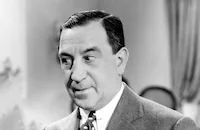The Lady's from Kentucky
Cast & Crew
Alexander Hall
George Raft
Ellen Drew
Hugh Herbert
Zasu Pitts
Louise Beavers
Film Details
Technical Specs

Synopsis
Gambler and bookmaker Marty Black wins a bet that entitles him to half interest in a promising horse named Roman Son, which is owned by Penelope "Penny" Hollis. Penelope, the daughter of an old Kentucky blue-blood family, has inherited the family stables, and is more interested in the welfare of her horses than their potential winnings at the races. This puts Marty into conflict with Penelope over the future of Roman Son. After the horse wins the juvenile stakes, Marty attempts to convince Penelope to keep racing it, but she refuses and returns to her Kentucky farm with the animal. Undaunted, Marty enters Roman Son in another race. The horse wins, but its youth and unpreparedness for racing nearly kills it. Realizing the error of his ways, Marty renounces betting and stays with the horse during its recovery. After he signs over his half of the horse to Penelope, Roman Son races in the Kentucky Derby and wins, but a tendon injury forces its retirement from racing. Seeing Marty's genuine concern for the horse, Penelope forgives him, and in love, the two return to the Kentucky farm.

Director

Alexander Hall
Cast

George Raft

Ellen Drew

Hugh Herbert

Zasu Pitts

Louise Beavers
Lew Payton
Forrester Harvey
Harry Tyler
Edward J. Pawley

Gilbert Emery
Eugene Jackson
Jimmy Bristow
Mickey O'boyle
Mike Arnold
Kentucky Lady
George Anderson
Stanley Andrews
Carol Holloway
Nell Craig
Roger Gray
Virginia Sale
Robert Perry
Oscar G. Hendrian

Robert Stevenson
Frank Moran
Jack Raymond
Robert Milasch
Harry Tenbrook
George Turner
Hooper Atchley

Fern Emmett
Paul Newlan
John Merton
Gloria Williams
Archie Twitchell
Frankie Van
Bill Cartledge
Charles Trowbridge
George Melford
Carl Stockdale
Tom Hanlon
Hal K. Dawson

Irving Bacon
Gus Glassmire
Helaine Moler
Paula De Cardo
Charles Wilson

James Flavin
Crew
Sy Bartlett
Malcolm Stuart Boylan
Rowland Brown
Olive Cooper
Hans Dreier
A. E. Freudeman
John Goodman
Hugo Grenzbach
Harvey Johnston
Jeff Lazarus
William Lebaron
Joseph Lefert
Walter Oberst
Theodor Sparkuhl

Film Details
Technical Specs

Articles
Ellen Drew, 1914-2003
She was born Esther Loretta "Terry" Ray on November 23, 1914, in Kansas City, Missouri. The daughter of a barber, her family moved to Chicago when she was still an infant and she lived a very quiet childhood far removed from the glamour of Hollywood. She was encouraged by some friends to enter a beauty contest when she was just 17. After winning, she tried her luck in Hollywood, but found that they were no immediate offers for her particular talents.
She eventually took a waitressing job at C.C. Brown's, a famed Hollywood Boulevard soda fountain, and had virtually abandoned her dreams as a starlet when William Demarest, a popular actor's agent and well-known character actor, spotted her. Demarest arranged a screen test for her at Paramount, and she was promptly placed under contract for $50 a week.
For the first few years, (1936-38), Drew got only bit parts, and was often uncredited. When she finally got prominent billing in the Bing Crosby musical Sing You Sinners (1938), she decided to change her name, from Terry Ray to Ellen Drew. She earned her first major role in Frank Lloyd's If I Were King (1938) opposite Ronald Colman, yet for the most part of her career, rarely rose above "B" material and second leads. Still, she had some fine exceptions: Preston Sturges' enchanting comedy Christmas in July (1940), with Dick Powell; Tay Garnett's lighthearted war romp My Favorite Spy (1942) co-starring Kay Kyser; Julien Duvivier's taut The Imposter (1944), holding her own with a brooding Jean Gabin; and Mark Robson's chilling low-budget chiller Isle of the Dead (1945) opposite Boris Karloff. Drew made some notable television appearances in the late '50s including Perry Mason and The Barbara Stanwyck Show, before retiring from the entertainment industry. She is survived by her son David; five grandchildren; and five great-grandchildren.
by Michael T. Toole

Ellen Drew, 1914-2003
Quotes
Trivia
Notes
The working title of this picture was The Gambler and the Lady. It was also reviewed as The Lady from Kentucky. According to Screen Achievements Bulletin, Dale Van Every was to have served as associate producer, but his participation in the film was later cancelled. Modern sources add that Sy Barlett, Olive Cooper and Doris Anderson contributed to the treatment and Anderson worked on screenplay construction.














